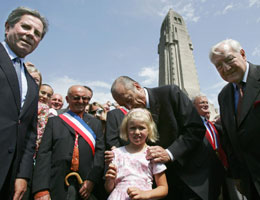
Chirac unveils memorial to France's Muslim soldiers in WWI
DOUAUMONT, France (AFP) - President Jacques Chirac paid homage Sunday to the 600,000 Muslim soldiers from former colonies who fought for France in World War I, unveiling a memorial on the site of the bloody Verdun battlefield.
"The Verdun army was the army of the people, and all the people took part. It was France in all its diversity," he said, inaugurating a white-walled Moorish-style monument in their memory.
The memorial, topped by a cupola built at a cost of 500,000 euros (627,000 dollars), is seen as a belated recognition for Arab and other Muslim soldiers from Africa who fought German troops under France's flag.
It stands in the shadow of the Douaumont Ossuary, a building opened in 1932 that features a long stone cross along the 45-metre height of its imposing cloister.
The ossuary contains the bones of some 130,000 unidentified remains found during and after the battle for Verdun.
That 10-month clash in 1916 resulted in a total 300,000 deaths on the French and German sides. An estimated 35,000 of them were Muslim soldiers fighting for France.
A monument to Jewish soldiers built in 1938 also stands nearby.
Previously, there existed only a small memorial pillar to African soldiers, as well as a Muslim section of the Douaumont war cemetery with 592 graves aligned to face Mecca.
The site of the new memorial had to be cleared by bomb crews because of the large amount of ordnance that still lies underground. Remains of several bodies were also found there.
Historically, the contribution of soldiers from France's colonial empire in both world wars has been overlooked.
But this year -- in the wake of riots on the outskirts of French cities last November largely fuelled by a sense of alienation among youths of immigrant North African families -- the tide has turned.
At the Cannes film festival in May, "Days of Glory", a French-Algerian film about the sacrifices of North African soldiers, and they prejudices they endured, in World War II earned its cast a collective best actor's prize.
Chirac, in his speech, glossed over the poor treatment France has often doled out to the colonial soldiers and their descendants, instead concentrating on the solidarity World War I forced on the country.
"This ceremony reminds us of the moment in its history, at Verdun and for Verdun, that the French nation came together and went forth to the end," he said.
"People of all walks of life, of all beliefs, of all religions, are at Verdun," he said.
"In that war, under our flag, there were Moroccan infantrymen, Senegalese, Algerian and Tunisian riflemen, soldiers from Madagascar and also from Indochina, from Asia, from Oceania.... The republic survived the unprecedented shock of the First World War thanks to the admirable will of its soldier-citizens."
Chirac said the bonds of friendship that today link France and Germany were born from the ashes of the wars, as was Europe's common quest for peace and prosperity.
The ceremony was the high point of commemorations marking the 90th anniversary of the battle of Verdun.
Muslim leaders in France have stated that the integration of Muslim troops into the French army in the wars laid the foundations of Islam in France.
Today, some five million people in France -- out of the country's total population of 62 million -- are Muslim, making it the largest Muslim community in western Europe.
Slowly, their heft as a political force in the country has grown, but so have tensions.
With the radicalization of Islam in parts of the world following the 2001 attacks in the United States and the 2003 invasion of Iraq, France has found itself caught out several times, notably by resistance to its 2004 ban on Muslim headscarves in state schools and by the November riots last year.
Pervasive racism against French people of African or Arab background has fuelled disgruntlement among youths in impoverished, high-immigrant areas and led them to question their French identity.
An attempt by the government to exert influence over Islamic groups on its soil, by founding a national umbrella body called the French Council of the Muslim Faith in 2003, has stymied because of infighting in the organization.
A rival body not sponsored by the state, the Rally of Muslims in France, emerged a week ago.
No comments:
Post a Comment